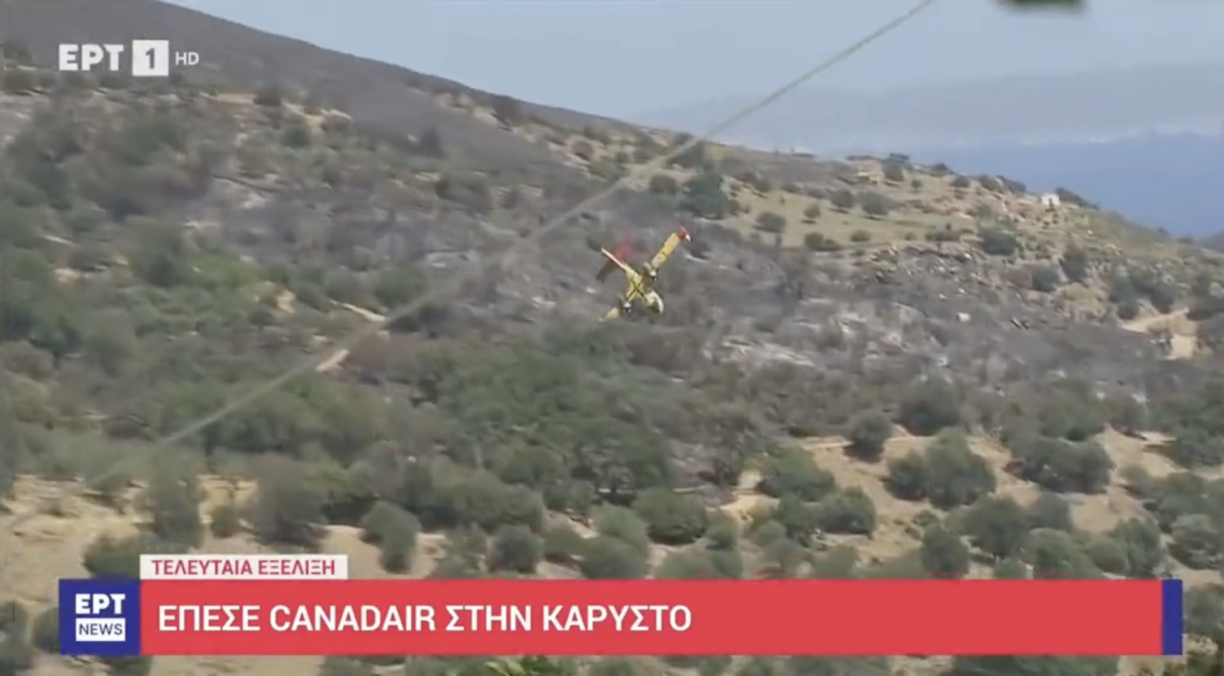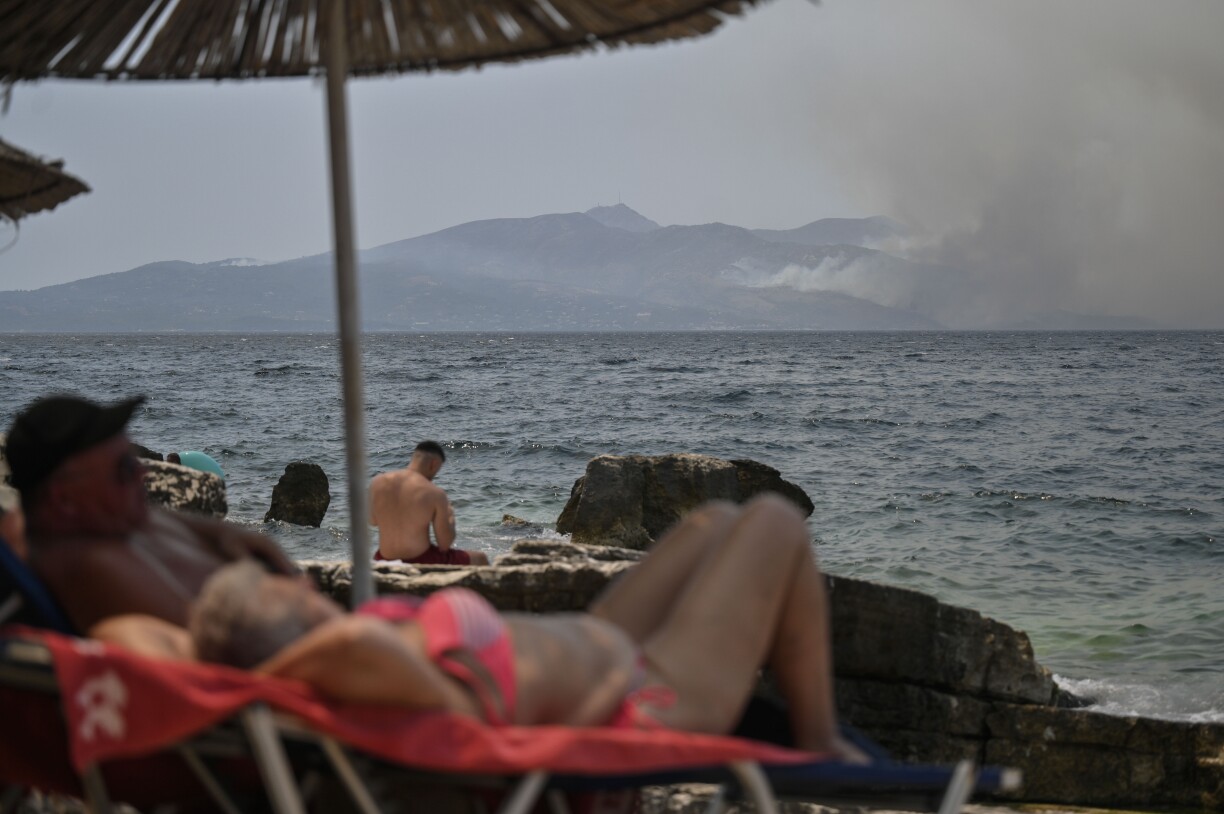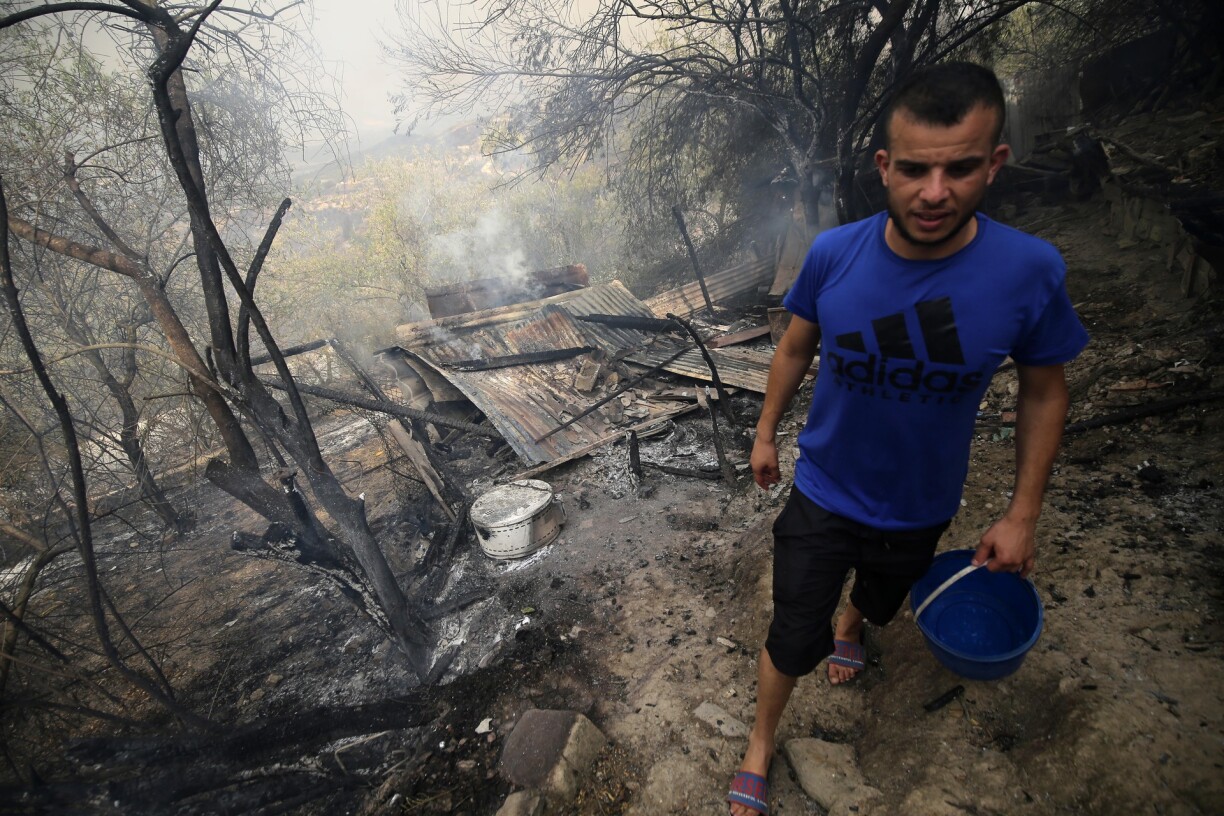
Greece’s fire department said the Canadair aircraft crashed into a ravine close to where the fire started on Sunday. Footage on state TV ERT showed the plane clipping a tree before falling nose-first and exploding.
The pilots were members of the Greek air force, and the defence ministry said it had declared a three-day mourning period.
The plane was among at least three other aircraft and around a hundred firefighters confronting the flames on Evia.
Wildfires have been raging in Greece amid scorching temperatures, forcing mass evacuations in several tourist spots including on the islands of Rhodes and Corfu.
Dramatic footage shows the moment the plane crashed into the ground, shortly after releasing water onto a wildfire.
The very hot weather comes after a weekend of intense heat as thousands of locals and tourists fled forest fires on the Greek islands of Rhodes and Corfu, with the prime minister warning the heat-battered nation is “at war” with the flames.
Scientists from the World Weather Attribution group said Tuesday the heatwaves that have hit parts of Europe and North America this month would have been almost impossible without human-caused climate change.
“We have another difficult summer ahead of us,” Prime Minister Kyriakos Mitsotakis told the cabinet.
WWF Greece on Tuesday said 35,000 hectares (86,500 acres) of forest and other land had been scorched by fire in the country just in the past week.
In the capital Athens the heat is expected to reach 41 degrees Celsius (106 degrees Fahrenheit), and hit up to 44C in central Greece, according to the national weather forecaster EMY.
Authorities evacuated nearly 2,500 people from the Greek island of Corfu on Monday, after tens of thousands of people had already fled blazes on the island of Rhodes, with many frightened tourists scrambling to get home on evacuation flights.

More than 260 firefighters were still battling flames for an eighth consecutive day on Rhodes, supported by nine planes and two helicopters.
A source at Rhodes airport operators Fraport on Tuesday said the situation had normalised, with traffic levels consistent with the height of the summer season on one of Greece’s prime travel destinations.
The Greek transport ministry said over 2,100 people had flown home on emergency flights on Sunday and Monday.
Fires were also raging on Greece’s second largest island of Evia, where Greek civil protection authorities issued an overnight evacuation order in one northern locality.
Mitsotakis said Greece’s state apparatus faced a “major challenge” as the prolonged heatwave and successive wildfires had officials on a 24-hour alert footing for “several weeks.”
The mercury hit 46.4C in Gythio, in the southern Peloponnese peninsula on Sunday, though failed to reach the hottest temperature nationally on record of 48C.
Mitsotakis has warned that the country faced “another three difficult days ahead” before high temperatures are forecast to ease from Thursday.
The severe heatwave in Greece has also been reflected across much of southern Europe and Northern Africa.
In Algeria at least 34 people have died as wildfires raged through residential areas, forcing mass evacuations.

In southeastern France officials Monday issued a fire warning at the highest level in the Bouches-du-Rhone region, warning that the weather conditions make the risk of flames “very high compared to normal summers”.
In Albania’s capital Tirana, temperatures surpassed 40C on Tuesday, spurring hospitals to open a string of emergency care centres to treat heat-related illnesses.
On average more than 100 patients a day have been flocking to each heat centre across the country, with ailments linked to the spike in temperatures including blood pressure issues, dizziness, and fainting, said Skender Brataj, who oversees the national centre for emergency medical care in Albania.
The exceptional temperatures in Greece have forced key tourist sites such as the Acropolis in Athens to close at the hottest times of the day.
Vassilis Kikilias, Greece’s civil protection minister, said crews had battled over 500 fires around the country for 12 straight days.
The fires are particularly devastating on islands such as Rhodes and Corfu where the tourist season is in full swing and hotels are often full.
Volunteers had come to the aid of foreign tourists in the north of Rhodes where nearly 200 people are still camped out at a school after being evacuated from the fires on Saturday.
“I can’t believe they are so nice, they gave so much in every way,” said 69-year-old British tourist Christine Moody, who was spending her first vacation in Greece when the fires hit.
“I am very moved,” she said.
In the village of Vati, in the southeast of the island, local mayor Vassilis Kalabodakis said the impact on the region was “tragic”.
“The village has been ordered to evacuate but we can’t abandon it,” he said. “We are leading the fight to protect our home”.